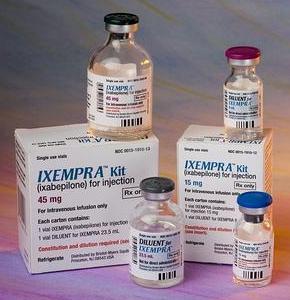
 If you have breast cancer that hasn’t responded to treatment with other drugs (like anthracycline and taxane), you may be taking one of the newer drugs on the market called “ixabepilone,” brand-name “Ixempra™.” The FDA approved it in October of 2007 after a quick 6-month review, so it’s still fairly new, and usually used in combination with capecitabine to treat metastatic or locally advanced breast cancer. Basically, it slows or prevents the growth of tumors by preventing cell division.
If you have breast cancer that hasn’t responded to treatment with other drugs (like anthracycline and taxane), you may be taking one of the newer drugs on the market called “ixabepilone,” brand-name “Ixempra™.” The FDA approved it in October of 2007 after a quick 6-month review, so it’s still fairly new, and usually used in combination with capecitabine to treat metastatic or locally advanced breast cancer. Basically, it slows or prevents the growth of tumors by preventing cell division.
Some of you have asked us-what’s the low-down on this drug?
In a trial of 752 patients, those receiving the combo therapy had a statistically significant improvement in survival as well as improvement in tumor response. What’s “statistically significant?” According to author Nick Mulcahy of Medscape, in terms of survival, about a month. Tumors, as well, either shrank or didn’t grow for about a month longer than in patients not on ixabepilone.
Of course, there are side effects. One of the main ones is that it can create neuropathy (or make it worse)-it did so in 65% of patients treated. Neuropathy is nerve damage that feels like numbness or pins and needles. If neuropathy worsens, your doctor may need to reduce the dose or delay further treatment.
Another effect: ixabepilone raised the risk of neutropenia (low white-blood cell count)-the complications of which caused death in a small percentage of patients. Thus doctors must ensure that your blood count is high enough before prescribing, and then will need to monitor your carefully throughout treatment. Many prescribe Neulasta to keep blood count up.
Patients who have a history of heart disease should also be cautious about this drug, as it was found to increase frequency of cardiac events in studies. Women who are pregnant or nursing shouldn’t take it, and if you have allergies to castor oil, tell your doctor. This drug had other potential side effects too, like anemia, fatigue, hair loss, nausea, vomiting, diarrhea, headache, mouth sores, and musculoskeletal pain. Less than 20% of patients also experienced hand/food syndrome, nail disorders, abdominal pain, and constipation. (Other possible side effects can be found here.) The European Medicines Agency’s review recommended that ixabepilone be rejected for approval because of concerns that it’s benefits do not outweigh the risks.
What’s the bottom line? The drug is young, so the evidence is still coming in. It does seem to provide a benefit, but just how much is still uncertain and depends on the individual. Checking the cancer forums shows a variety of responses. Some women tolerate it well, others not so much. For some it provided a strong benefit, for others, it didn’t help at all. Look at the totality of your condition, your life, and your experience, and make the decision from there.
“I did well on Ixempra,” says tzizzw. “I was fatigued but have had worse. It really is amazing how differently we react to treatments.”
“I did 2 doses of Ixempra and decided that was it,” says sunbearz. “6 months later I still have damage. Neuropathy hand tremors.”
Constantine Kaniklidis of Breast Cancer Watch writes, “I advised Ixempra and after just a few cycles all disease-which was impervious to all previous treatment and kept advancing-was stabilized.”
Ask questions, then trust yourself and your doctor to come up with the best solution. Ixempra is costly-about $4570 per cycle-so be sure your insurance covers it.
Has your doctor prescribed Ixempra? Please share your experience.

